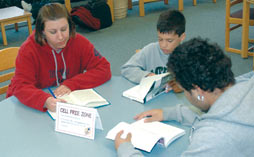By Sabrina Carrington/reporter

Demand for lifelong learning programs in higher education has increased dramatically in recent years, and Tina McGee, a 33-year-old education major, is experiencing how her enrollment at TCC will change her life.
“My kids are so used to me helping them with their homework, but now I will be sitting right next to them, struggling with my own,” she said.
Starting a new career or looking to increase pay in a current job, higher education makes sense at any age, so more adults are leaving the workforce and stepping back into classrooms.
More and more students worldwide are non-traditional, adult learners who work full or part time or have children or other family obligations.
According to the Association of Non-Traditional Students in Higher Education, “[Many older adults] are pursuing careers, raising children and providing extraordinary service as volunteers in their communities while they go to school.”
These non-traditionals often are seeking a second degree or returning to school after a break or military service.
The National Center for Education Statistics reports 41 percent of students enrolled in degree-granting higher education institutions in fall 1998 were adult learners.
These six million students, age 25 and older, need a college education to support and develop their careers and to acquire new skills and knowledge in a society where they are likely to have longer and more productive life spans.
The number of students 35 and older in degree-granting institutions has soared from about 823,000 in 1970 to an estimated 2.9 million in 2001—doubling from 9.6 percent of total students to 19.2 percent, according to the National Center for Education Statistics.
The Institute for Higher Education Policy reports students 40 and older increased by 235 percent from 1970 to 1993.
In Texas, non-traditional students are becoming more common as many colleges and universities make juggling work, school and home more manageable by increasing the offerings of night, weekend and online classes, according to the Center for Education Statistics.
TCC provides flexible programs, evening and weekend courses and instructional television or online options designed specifically to serve the working adult student. TCC has almost every class available online, nights or weekends, giving the residents of Tarrant County and all of North Texas the options they need to go back to school.
McGee, a SE student, is excited to be back in school this semester. She also is the assistant director of a nearby child care center and the mother of three children ranging in ages 5 to 16.
With her demanding life, McGee is a typical non-traditional.
“TCC is very convenient for me in every way. It’s close to home and work; plus, they have so many classes for me to choose from,” she said. “I am mostly taking night and weekend classes; I am going to try online next fall.”
Millions of adult students successfully return to college to obtain a degree. However, they often have numerous responsibilities to consider when making the decision. These responsibilities can include marriage, children, work, community obligations or care of elderly parents. The time and commitment needed to complete a degree program and balance these responsibilities can be a challenge.
Adults might also be concerned about fitting in with the younger, traditional students or think they may be too old to get back into the groove of school. However, with so many adults returning to college, the definition of non-traditional may soon change.
As thousands of non-traditional students can attest, it is never too late to go back to school.
























